QuestionQUESTION: We have a stray mommy kitty that we brought inside to have her kitties. She had them 36 hours ago. Her nipples do not look real engorged, however the kitten do seem real content and sleeping allot. When I mess with them or she moves they cry. I did notice today that there was a little blood in the box. I am not sure if it is from mom or kitties. I am seeing what I think it fecal matter from the kitties, so I think they must be getting something, but her back nipples are so raw looking. I don't know if they are bleeding, if she is bleeding or if it is a kitty bleeding. I do believe that she mated with a Manx tom because we have 3 out of 4 with no tails. Anyway, can you give me any advice. Hubby doesn't want to bring them to the vet because he wants to just find a home for them because this is not our cat. We already have one. If you think it is necessary please let me know.
Stacy
ANSWER: Stacy,
I wanted to start out by congratulating you on the new arrivals and thanking you for caring enough to provide this mom with a safe, warm place to have her family and raise them. Based on your description I would say that mom could still be having a bit of blood tinged vaginal discharge from her recent delivery, but it's a good idea to keep an eye on the amount, color, odor and frequency of this discharge to monitor whether or not mom may have a vaginal or uterine infection that could be life threatening to her newborn family as well as her own survival. It's quite possible that everything is fine and progressing normally and the discharge you're seeing may be a product of delivering the kittens. It's a good idea to pick up each kitten and check the umbilical stump to ensure that mom hasn't accidentally cut any of the cords too short or bitten into the abdomen of any kittens. The umbilical stumps should be getting fairly dry, be medium brown to black in color and there shouldn't be any moisture or discharge from that area. I would also recommend watching the kittens when they nurse to make sure that everyone is healthy. Sometimes kittens can be born with cleft palates, in this instance it's not uncommon for milk to come bubbling out of the nose when a kitten's nursing. You can gently open each kitten's mouth and check the roof of their mouth with a flashlight, but in my experience it's not a common defect in random bred cats. It's not uncommon to see some vaginal discharge from the new mother after she's given birth. Any discharge coming from mom's vagina should clear up soon, if you're noticing that the discharge isn't stopping or it's heavy discharge it may mean there's a problem that requires treatment by a vet. If you notice that the discharge takes on a foul smell the cat should be seen by a vet immediately to treat any infection that might be present.
Since you mention that the kittens seem quiet and content unless you are handling them or their mother moves I think that everything's probably okay for the moment. If you notice that mom develops tremors, anxiety and a stilted gait she may have a calcium deficiency that requires treatment with IV calcium and magnesium administered by a vet. At the moment it sounds like you're taking good care of this new family, they're very lucky to have found a human willing to help them by taking them into a home and working to find homes for everyone. I would like to point out that newborn kittens are born with very little resistance to viral or bacterial infections. Since you have no history about the mother it's possible that she hasn't had her basic vaccines, this may mean she's susceptible to infection as well. I would recommend keeping mom and her new family isolated from any other animals and be sure to change bedding in the nest box whenever it becomes soiled. Making sure to wash your hands thoroughly in hot, soapy water before and after handling the little family to try and prevent infection. It's important to ensure that the nest box is warm enough for the kittens, they aren't able to maintain their own body temperature so filling the box with dry bedding such as old towels or blankets, will help the kittens to maintain their body temperature and hopefully prevent any infections. Mom should have a small kitten sized litter box near where her kittens are, this will help her to feel more secure leaving the nest to use the toilet. The reason I recommend a kitten sized litter box is because mom will be teaching her babies how to use the litter pans sooner than you think and kittens learn by imitating their mother. It's not a bad idea to have more than one litter box available for mom as some cats like to urinate in one litter pan and defecate in the other.
For the moment there's very little that human caregivers can do for a healthy mom and litter of kittens. Keeping the environment warm, clean, dry, quiet and dimly lit is important to reduce stress on mom and prevent discomfort for the kittens when they finally do open their eyes in a week or two. It's important to make sure that you handle each of the kittens several times a day although for the moment they shouldn't be taken too far from the nest because it may cause mom to move the whole litter or even reject the kittens that have been handled. Young children shouldn't be allowed to handle the kittens at this stage, they're too fragile and tiny at the moment. Handling the kittens and getting them comfortable with being touched and cuddled by a variety of different people is important for their social development, the more people a kitten meets in the first 10-12 weeks of life the more comfortable and confident s/he will be when it's time to place him/her in a new home environment. I wouldn't suggest allowing anyone outside of the immediate family to handle the newborns yet, but when the kittens are three weeks old you can slowly start to introduce new people and allow them to handle the babies, just be sure that everyone takes the appropriate hygienic precautions.
When it comes to nutrition for a nursing queen there are as many opinions as there are cat lovers. I would recommend trying to avoid feeding lower quality foods as much as possible, the ingredients used in these foods are often low quality and the cat and kittens can't make full use of the nutrients that are found in the food. Cats are obligate carnivores which means that vegetable and grain based foods aren't geared towards meeting their needs. At the moment and throughout the time mom's nursing her babies I'd recommend feeding her as much as she wants. Right now mom's eating for herself and 4 rapidly growing babies. It's important to scoop all waste from the litter at least once daily and it's best to properly disinfect the litter box using a weak bleach solution (5 parts water to 1 part bleach) a minimum of once a week. Food and water dishes should be washed thoroughly in hot soapy water daily and disinfected every few days in the bleach solution so that mom's not bringing bacteria back from the food/water dishes or litter box to her newborns.
If the newborns are having stools that look loose I'd recommend that you pick up a product called BeneBac made by KMR and administer it as directed to each kitten or you can use a new oral syringe from the pharmacy to administer a small amount of organic, plain, unsweetened yogurt. It generally works best if you give each kitten about 1 mL of yogurt by mouth 1-3 times daily for 2-3 days. The reason for administering the yogurt is because it contains beneficial bacteria found naturally in the digestive tracts of mammals and if there is an imbalance of these beneficial bacteria you should notice a fairly rapid increase in the firmness of the kittens' stools. If the kittens begin to have loose bowel movements again simply repeat the yogurt or BeneBac treatments for another couple of days. When giving unweaned kittens anything by mouth it's important to make sure that you do so slowly, gently and with all four of the kitten's paws facing the floor to avoid the possibility that the little ones will inhale or choke on the yogurt. Mom could also benefit from eating some plain yogurt because as a stray she's probably eaten things that she shouldn't have to survive. She's probably not accustomed to getting fresh, regular food so feeding a high quality regular diet may cause some digestive upsets like vomiting or diarrhea. If a nursing mother has diarrhea or has been vomiting a fair bit she can become seriously dehydrated quite quickly because she's nursing which could cause medical problems for this new family without a vet's prompt diagnosis and treatment.
At the moment the kittens' lives should essentially be about nursing and sleeping, it's very important for the rapid growth and development the newborn kittens will be experiencing in the next few weeks. Since you mention that most of this newborn litter was born without tails it's a good idea to you check to make sure that no birth defects are present in the anal or genital area of each kitten. You need to make sure that each kitten has an anal and genital open and that the area of their tail stub is completely closed over. If any kittens are missing anal or genital openings the most humane choice would be humane euthanasia, if you notice that one or more kittens have open wounds at the end of their tail stubs which expose the end of the spine the vet can either treat the kitten surgically or humanely euthanize the little one. The course of action you'll need to take will depend on your financial situation, the vet's medical opinion and the amount of care you're able to provide for this homeless family.
It's a good idea to check mom's mammary glands a couple of times a day, if they seem hot, swollen to the point of being rigid and engorged and you can't get any milk from them or you get only foul smelling slightly thick liquid mom will have to see a vet because these can be indicators of mastitis which is an infection of the mammary glands. If mom has mastitis she will require medical attention, a course of antibiotics and most likely a follow up visit to ensure that the medicine has worked. If mastitis is the problem you may have to take on the responsibility of feeding these newborns using a kitten milk replacement formula such as Mammalac, Just Born or KMR mixed according to the package directions. Do not put any creams or medication onto the nipples without the recommendation of a qualified vet, it's not safe for the kittens to ingest topical medications and there's a good chance that these medicines can cause health problems for the newborns.
I would recommend that the kittens stay with their mother for a minimum of 10-12 weeks. This will allow them to socialize, learn how to be a cat, be fully weaned and ready to go into good homes. Mother cats do not require human help to wean their kittens, they do so quite nicely on their own sometime in the first 6-12 weeks of life. The longer a kitten can nurse from mom the better equipped s/he will be to fight off viral/bacterial infections because mom's milk has antibodies meant to protect her kittens. You can start trying to introduce solid food around 6-8 weeks of age - I usually use a commercially available weaning formula mixed according to the directions added to pureed meat such as chicken, turkey, lamb or beef and I also add plain, unsweetened, full fat organic yogurt because it contains beneficial bacteria normally found in the intestinal tracts of mammals and can prevent diarrhea and other digestive upsets while introducing the kittens to solids. I normally cook the organic meat of choice, mince it finely, put it into the food processor, add 1 tbsp of yogurt per 1/2 cup of meat and the weaning formula (mixed according to the package directions) provides the liquid needed to puree this weaning formula. The resulting mixture should resemble slightly runny cooked cream of wheat cereal.
Some kittens need a helping hand to understand what to do with solid foods. The ages I've given for introducing solid foods aren't carved in stone, similar to human babies different kittens are ready to meet different milestones at different times. To start the kittens off on solids you can gently push their muzzle into the food mix and they will voluntarily lick it off. If any kitten seems particularly upset by this technique or s/he simply won't lick the food off of his/her muzzle then I'd recommend being patient, letting mom bathe the kitten and trying again another day. Most kittens require a few messy lessons to get them started on solid food, but they usually get the point fairly quickly. Once the kittens are comfortable eating the homemade kitten weaning mixture it's a good plan to start gradually reducing the pureed meat and introducing a high quality, holistic food made from human grade ingredients.
If you would prefer to start the kittens off on the diet that's described on the website I've suggested you will likely find the kittens more receptive to their first solid foods provided they're served at body temperature so as not to cause digestive upsets or other food related problems. I feed a combination of a homemade raw diet and a commercially produced holistic food made from human grade ingredients called Spot's Stew made by Halo. This company makes a couple of varieties of crunchy food as well as canned food, treats and supplements. If you intend for the kittens to eat a commercially produced food it's probably best to start the kittens off by gradually adding canned food and reducing the meat in the weaning mix and as the kittens reach 8-9 weeks old you can slowly introduce crunchy food. Halo (the company that makes Spot's Stew) makes a small sized kibble this food's great when it comes to introducing tiny mouths to crunchy food.
Since you already have a resident cat you might be interested in the nutritional information on the following website: catinfo.org. This is a great site written by a vet about the actual dietary requirements of cats, the myths surrounding the pet food industry and how to feed your cat the absolute best possible diet to meet his/her needs. If you aren't comfortable feeding the diet suggested on this website there are a couple of good commercially produced alternatives. The more natural and higher quality you can keep a cat's diet the healthier that cat will be which is why I feed a mixture of a homemade raw diet and a high quality commercially produced food which is holistic and made from human grade ingredients.
Spot's Stew Sensitive Cat by Halo costs roughly $25 CAN for a 6 lb bag which lasts my 3 resident cats for around a month. The nursing mom will likely eat the food almost as quickly as my three resident cats do because she needs to meet her own nutritional requirements as well as those of her growing family. It might interest you to know that by feeding a high quality food made from human grade ingredients (such as Wellness or Spot's Stew) your cat will be able to live a longer and healthier life. That means that you'll spend less money at the vet, and as an added bonus cats being fed a high quality diet also tend to use less kitty litter, they use more of the food they take in so less ends up as waste and the waste smells less foul (another bonus in my books). I'd be more than willing to offer more tips on caring for the new family as well as helping them to get the best possible start in life. Please let me know if there's anything I can do to help you with your stray foster mom and kittens or your own resident cat.
---------- FOLLOW-UP ----------
QUESTION: I have looked them all over and everyone seems to be doing fine. Right now I have her eating kitten food. Thanks so much for all of the information. I will take your advice.
Stacy
ANSWER: Stacy,
If everyone seems to be doing fine all that you can do is watch the new family carefully and be sure to handle the kittens a few times daily. The reason that I've made nutritional recommendations is because I've gotten to a point where I no longer trust most commercially produced pet foods in terms of safety and quality. So long as mom is being given as much of a decent quality food as she wants in a day she should be able to meet the needs of her growing family. Enjoy your new foster kitties, have fun with mom and take good care of the mother, her kittens and yourself. I'd be interested in hearing how things are going if you'd like to send updates my way.
---------- FOLLOW-UP ----------
QUESTION: I was going to send a picture in my last post, but I saw no way.
AnswerStacy,
The link to send an image comes on the third screen and it's quite small. Your first screen is to ask a question, the second is to write the question out and the third is your opportunity to run spell check and edit your final question. The link reads simply 'to attach an image' and it's highlighted so that if you click on it you should receive further instructions about how to attach your photo although I do believe you can only attach one picture per question.

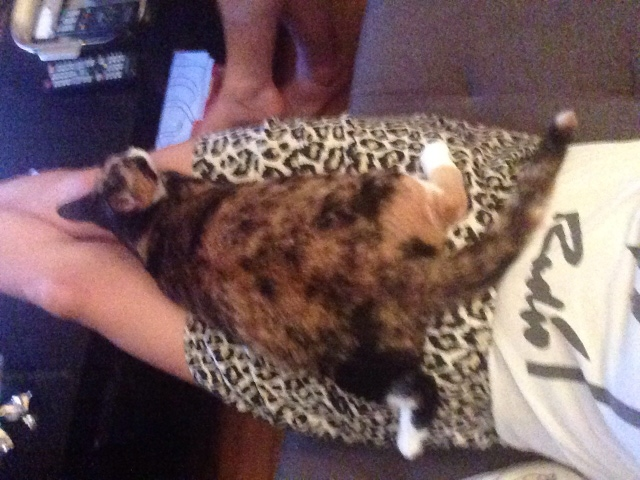 Cat eating too much?
Question
Chickpea
Hello,
Ive attached a photo of
Cat eating too much?
Question
Chickpea
Hello,
Ive attached a photo of
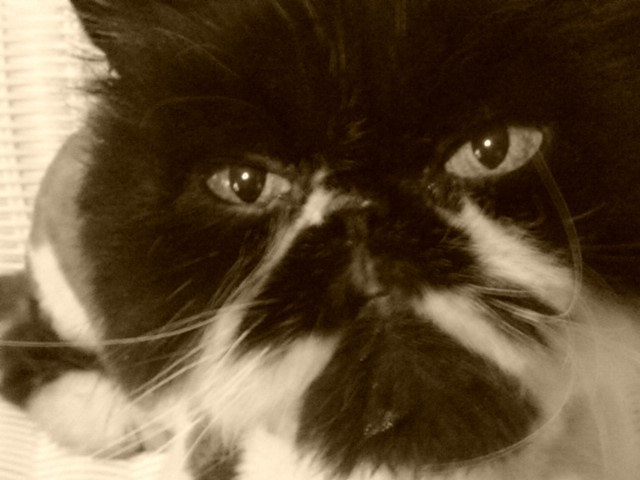 Throwing Up and Pooping
Question
Pepper
Hi,
Well my cat is 12 years old and la
Throwing Up and Pooping
Question
Pepper
Hi,
Well my cat is 12 years old and la
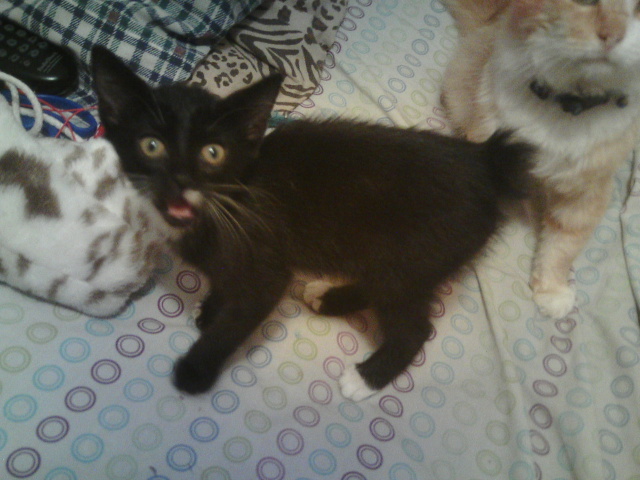 what breed is my bobtail kitten?
Question
Midnight
About a month ago I got a little bobt
what breed is my bobtail kitten?
Question
Midnight
About a month ago I got a little bobt
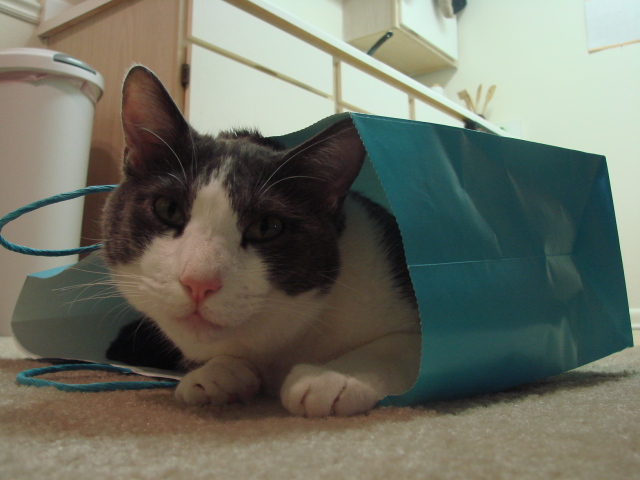 Cat behavior question...
QuestionZero the goofball
QUESTION: Hi Kate,
I
Cat behavior question...
QuestionZero the goofball
QUESTION: Hi Kate,
I
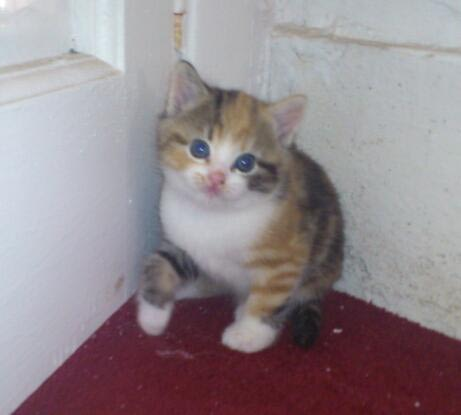 is my male kitten a tortoiseshell?
Question
our wee guy our wee guy
Hi,
I am
is my male kitten a tortoiseshell?
Question
our wee guy our wee guy
Hi,
I am